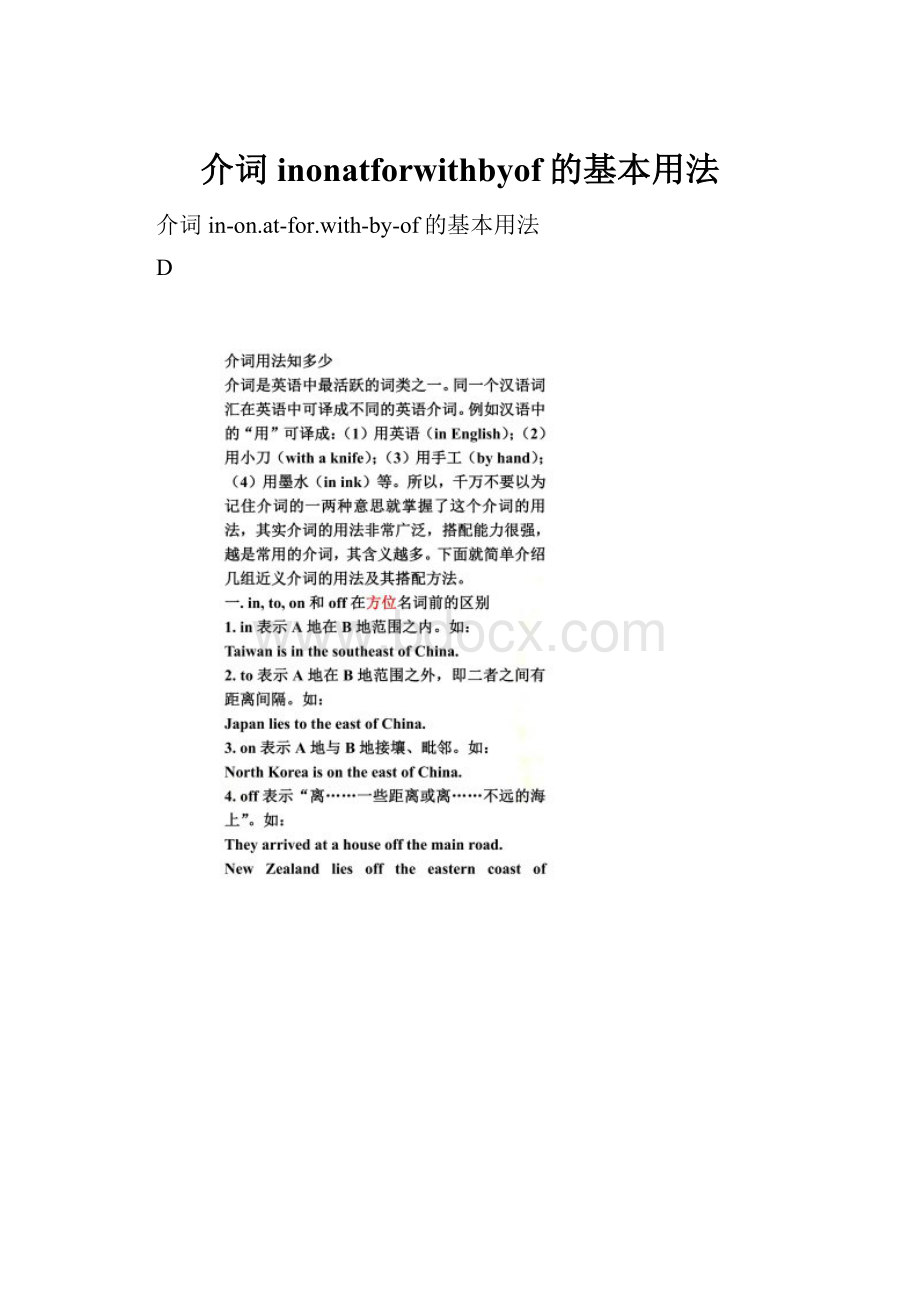介词inonatforwithbyof的基本用法.docx
《介词inonatforwithbyof的基本用法.docx》由会员分享,可在线阅读,更多相关《介词inonatforwithbyof的基本用法.docx(9页珍藏版)》请在冰豆网上搜索。

介词inonatforwithbyof的基本用法
介词in-on.at-for.with-by-of的基本用法
D
内”。
如:
Theseproductswillbeproducedinamonth.
注意:
after用于将来时间也指一段时间之后,但其后的时间是“一点”,而不是“一段”。
如:
Hewillarriveaftertwoo’clock.
3.on指时间表示:
(1)具体的时日和一个特定的时间,如某日、某节日、星期几等。
如:
OnChristmasDay(OnMay4th),therewillbeacelebration.
(2)在某个特定的早晨、下午或晚上。
如:
Hearrivedat10o’clockonthenightofthe5th.
(3)准时,按时。
如:
Ifthetrainshouldbeontime,Ishouldreachhomebeforedark.
4.by指时间表示:
(1)不迟于,在(某时)前。
如:
Hewillcomebysixo’clock.
Jackhadmadesomefriendsbythetimeyoucame.
(2)在……间,在……的时候。
如:
Heworkedbydayandsleptbynight.
5.through指时间意为“从……开始到结束”,此时与throughout相同。
如:
Weworkhardallthroughtheyear.
三.near,by,beside,at表示“在……附近”时的区别
1.near表示相对的近,实际距离可能还很远。
如:
SuzhouisnearShanghai.
2.by和beside都表示靠近,实际距离不可能很远,但beside比by更具体地表示出“在……旁边”的意思。
如:
Hewassittingbesideher.
3.at也有“在旁边”的意思,但多表示有目的的行为所处的位置,而by和beside仅表示位置关系。
如:
Thestudentsaresittingatthedeskslisteningtotheteacher.
Severalstudentsaresittingby/besidethewindowtalkingaboutafilm.
四.at,in和on表示地点时的区别
1.at表示地点:
(1)用于指较小的地方。
如:
Ishallwaitforyouatthestation.
(2)用于门牌号码前。
如:
Helivesat115ZhongshanRoad.
2.in表示地点:
(1)用于指较大的地方。
如:
HelivesinShanghai.
(2)虽然是很小的地方,如果说话人住在那里,也可用in。
商店、学校、机关等,若看作一个地点(point)用at,若看作一个场所(place)用in。
如:
Imethimatthepost-office.
I’mnowworkinginthepost-office.
3.on表示地点,一般指与面或线接触,意为“在……上;在……旁”。
如:
Thepicturewashangingonthewall.
NewYorkisontheHudsonRiver.
五.besides,except,exceptfor,but表示“除……外”之间的区别
1.besides表示“除了……以外,还有……”,具有附加性质。
如:
BesidesMrWang,wealsowenttoseethefilm.(王先生也去了)
注意:
besides用于否定句中时,与except,but同义,可互换。
如:
Wehavenootherbooksbesides/exceptthese.
2.except表示“……除外”,具有排它性质。
如:
WeallwenttoseethefilmexceptMrWang.(王先生没去)
3.exceptfor表示“除了……”,即表示除去整体中的一部分。
如:
Thecompositionisverygoodexceptforafewspellingmistakes.
4.but意为“除了”,与except同义,except强调被排除的部分,but则强调整句的内容,常修饰否定意义的代词。
如:
Nobodyknewitbutme.
时间介词in,on与at的用法
介词in,on与at都可用于表示时间的名词前,但用法各不相同,其区别在于:
一、用in的场合
(1)表示“在某年/月/季节”这个含义时,须用介词in。
例如:
Shecametothiscityin1980.他于1980年来到这个城市。
Itoftenrainshereinsummer.夏天这里常常下雨。
(2)表示“从现在起一段时间以后”时,须用介词in。
例如:
Theywillgotoseeyouinaweek.他们将在一周后去看望你。
Iwillbebackinamonth.我将在一个月后回来。
(3)表示“在某世纪”时,须用介词in.例如:
Thismachinewasinventedintheeighteenthcentury.这台机器是在18世纪发明的.
Greatchangestookplaceinthetwentiethcentury.20世纪发生了巨大变化.
(4)表示“在某年代或特定世纪某年代”时,须用介词in。
例如:
Thisincidenthappenedinthe1970''''s.该事件发生在20世纪70年代。
TheAnti-JapaneseWarbrokeoutinthe1930''''s.抗日战争爆发于20世纪30年代。
除此之外,morning/evening/afternoon三个词也常跟介词in连用。
例如:
Don'twatchTVtoomuchintheevening.晚上看电视不要太多。
Theysometimesplaygamesintheafternoon.他们有时在下午做游戏。
二、用on的场合
(1)表示“在具体的某一天”或“(在具体的某一天的)早上、中午、晚上”等,须用介词on。
例如:
JackwasbornonMay10th,1982.杰克生于1982年5月10日。
Theyleftonarainymorning.他们是在一个雨天的早上离开的。
HewentbacktoAmericaonasummerafternoon.他于一个夏天的下午返回了美国。
(2)表示“在星期几”或“在星期几的早上、中午、晚上”等,须用介词on。
例如:
Wedon'tgotoschoolonSaturdayandSunday.我们星期六和星期天不上学。
Whattimedoyougetuponweekdays?
你在平日什么时候起床?
IheardthisstoryonSaturdaymorning.我是在星期六的早晨听到这个故事的。
(3)表示“在某一节日”时,须用介词on。
例如:
WeusuallyeatmooncakesonMid-autumnFestival.我们通常在中秋节吃月饼。
MrHureceivedacardonTeachers'Day.胡老师在教师节那天收到了一张卡片。
注意:
当morning,evening,afternoon被of短语修饰,习惯上用in,而不用on.例如:
intheearlymorningofSeptember10th在9月10的清晨;inthelateafternoonofSeptember12th在9月12日的傍晚。
三、用at的场合
(1)表示“某一具体时刻(即几点几分时)”,须用介词at。
例如:
Hegetsupatsixo'clockeveryday.他每天六点起床。
Igothomeatfivethirtyyesterdayafternoon.我昨天下午五点半到家。
(2)用在特定的时候(时节、时机)时,须用介词at。
例如:
Theywerehappyatthattime.他们那时很幸福。
Ithinktheshopisclosedatthistimeofday.我认为商店在白天的这个时候关门了。
(3)表示“在中午、在夜晚、在周末”时,须用介词at。
例如:
Whatdoyouoftendoatnoon?
你中午经常做些什么?
Youcanseemanystarsintheskyatnight.夜晚你能看到天空中有许多星星。
(4)表示“在……岁”时,须用介词at。
例如:
Attheageofnine,theboycouldswimwell.在九岁的时候,这孩子就游泳游得很好了。
Attheageoftwenty,IbegantoteachEnglishatthisschool.在二十岁的时候,我就开始在这所学校教英语了。
注意:
在含有next,last,this,one,any,each,every,some,all的词组和tomorrow,yesterday,thedayaftertomorrow,thedaybeforeyesterday前不用任何介词。
例如:
Whatdidyoudolastsummerholidays?
去年暑假你做了些什么?
Whatareyougoingtodothedayaftertomorrow?
后天你打算做什么?
各类介词:
in,of,on,to,with,of,at的用法
谈谈介词(Preposition)
(一)
介词在英语用词里也属于难缠的一个项目。
因为它涉及方面很广,而且变化多端,往
往令人捉摸不定,记起来很麻烦。
因此就有有心人弄了一个《介词口诀》来帮助学习者
;也有人写了《PrepositionSong》令学习者一面唱歌一面轻松地记忆介词的用法。
介词英文叫作Preposition(简称prep),它由pre和position组成,pre是前面的意
思,而position是位置的意思。
因此以前中文译作“前置词”,就是一种放在名词(或
相当于名词的词语)前面的虚词。
一、常用的介词
about,above,across,after,against,around,at,
before,behind,below,beneath,beside,besides,between,beyond,by,
down,during,
except,
for,from,
in,inside,into,
like,
near,
of,off,on,out,outside,over,
since,
through,throughout,till,to,toward,
under,until,up,upon,
with,without,
accordingto,
becauseof,
bywayof,
inadditionto,
infrontof,
inplaceof,
inregardto,
inspiteof,
insteadof,
onaccountof,
outof.